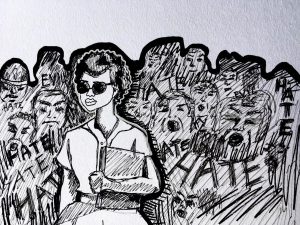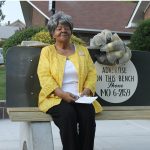calsfoundation@cals.org
Words That Matter–Voices of Civil Rights: The 1st Day at Central High (September 4th, 1957)
This audio walking tour follows the footsteps and narrates eyewitness accounts of the Little Rock Nine’s ill-fated first attempt to attend classes during the historic desegregation crisis. Researched, scripted, and ecorded by students in the Central High Memory Project.
- Little Rock Central High Thinking Like An Historian Questions
- Script“Words That Matter”: Voices of Civil Rights–The 1st Day at Central High
- Script Footnoted
- VCR 1st Day At Central Final Script 091817
Walking Tour
This audio walking tour follows the footsteps and narrates eyewitness accounts of the Little Rock Nine’s ill-fated first attempt to attend classes during the historic desegregation crisis. Researched, scripted, and recorded by students in the Central High Memory Project.
Introduction • Project purpose, student credits, sponsors
Audio Stop 1 • West entrance of Visitors Center (hear “NIGHT BEFORE” excerpts)
Audio Stop 2 • Former Bus Stop 13th & Park—Elizabeth Eckford gets off city bus (hear “MORNING OF”)
Audio Stop 3 • SW corner of school campus, Daisy Bates Ave (14th) & Park—Elizabeth Eckford turned away from campus by Guardsmen, who point toward opposite side of street
Audio Stop 4 • Across street and 25 steps to the right (south) from corner—Elizabeth Eckford is spotted by crowd of segregationists and turns back into middle of street; the crowd follows around her
Audio Stop 5 • Mid-Block (back to school side of street)—where Elizabeth Eckford tries again to enter school campus, but is blocked again by Guardsmen
Audio Stop 6 • Middle of street, again—where iconic photo of Elizabeth’s historic solo walk is taken by Will Counts, Arkansas Democrat
Audio Stop 7 • NE corner of 16th & Park, site of former Bus Stop bench—where Elizabeth Eckford goes to wait for bus after being locked out of Drug Store [still standing on SE corner] when she tried to call taxi; here she is approached by several persons but remains surrounded by menacing crowd; when city bus arrives, she boards and leaves for her mother’s workplace, accompanied for short while by Grace Lorch, wife of white math professor at Philander Smith who supported integration
Stop 8
Optional audio • Same corner, facing Central— (hear Headlines AFTER the 1st Day)
Other Languages:
- VCR 1st Day At Central Final Script Audio Stop 2 French
- VCR 1st Day At Central Final Script Audio Stop 2 Spanish
LEARN MORE AT THE ENCYCLOPEDIA OF ARKANSAS

Credits
Memory Project Editing Team
Senior Editors (from LRCH): Morgan Hibbard; Zoie Moore; Tristam Thompson; Zia Tollette; Angela Wang; Jessie Bates; Julia Greer; Logan Meyer
Contributing Editors (from LRCH): Ethan Dial; Olivia Igwe; Jamee McAdoo; Norel McAdoo
Translators
French Translation: Anna Mitchell and Laetitia Bobet (Portland, ME high school students)
Spanish Translation: Roberto Ordaz (LRCH)
Images
Picture of Elizabeth Eckford on 4 Sep 1957: Rachel Gibson (Harding University)
Virtual Tour Map: Isabel Farnsworth (LRCH)
Bibliography
Associated Press. “Satchmo Drops Russian Trip, Raps Eisenhower and Faubus.” Arkansas Gazette, September 19, 1957. In Little Rock, 1957: Pages from History, The Central High Crisis, edited by Griffin Smith Jr. Little Rock: Arkansas Democrat-Gazette, 1997.
Beals, Melba Pattillo. Warriors Don’t Cry. New York: Washington Square Press, 1994.
Counts, Will. A Life Is More Than a Moment: The Desegregation of Little Rock’s Central High. Bloomington: Indiana University Press, 1998.
Crisis in the South, The Little Rock Story: A Selection of Editorials from the Arkansas Gazette. Little Rock: Arkansas Gazette, 1959.
Donhau, Jerry. “Negro Girl Turned Back, Ignores Hooting Crowd.” Arkansas Gazette, September 5, 1957, in Little Rock, 1957: Pages from History, The Central High Crisis, edited by Griffin Smith, Jr. Little Rock: Arkansas Democrat-Gazette, 1997.
“Elizabeth Eckford on Her First Day” (interview). In A Life Is More Than a Moment: The Desegregation of Little Rock’s Central High, by Will Counts. Bloomington: Indiana University Press, 1998.
Jacoway, Elizabeth. Turn Away Thy Son: Little Rock, The Crisis That Shocked the Nation. New York: Free Press, 2007.
King Online Encyclopedia, Stanford University. “Dr. King Asks Non-Violence in Little Rock Crisis” Atlanta Daily World 26 September 1957. Accessed April 26, 2016: http://kingencyclopedia.stanford.edu/encyclopedia/documentsentry/dr_king_asks_for_non_violence_in_little_rock_school_cri sis/index.html.
King Online Encyclopedia, Stanford University. “Telegram from King to President Eisenhower Urging Action in Little Rock.” Accessed April 26, 2016: http://kingencyclopedia.stanford.edu/encyclopedia/documentsentry/telegram_from_king_to_president_eisenhower_urging_a ction_in_little_rock.1.html.
LaNier, Carlotta Walls. A Mighty Long Way: My Journey to Justice at Little Rock Central High. New York: One World Books, 2009.
Little Rock School District. “Central High School Desegregation Timeline: 1954-56 [and 1957].” Accessed August 30, 2016: www.lrsd.org/sites/default/files/nexpoint/TempPics/history/deseg54–57.pdf.
Little Rock School District. “Central High School Desegregation Timeline: 1958.” Accessed August 30, 2016: http://www.lrsd.org/sites/default/files/nexpoint/TempPics/history/deseg58.pdf.
Little Rock School District. “Central High School Desegregation Timeline: 1959.” Accessed August 30, 2016: http://www.lrsd.org/sites/default/files/nexpoint/TempPics/history/deseg59.pdf.
Roberts, Terrence. Lessons from Little Rock. Little Rock: Butler Center Books, 2009.
Roosevelt, Eleanor. Foreword to The Long Shadow of Little Rock, by Daisy Bates, xix-xxi. Fayetteville: University of Arkansas Press, 1986.
Schnedler, Jack. “The Stage Is Set for a Historic Confrontation.” In Little Rock, 1957: Pages from History, The Central High Crisis, edited by Griffin Smith Jr. Little Rock: Arkansas Democrat-Gazette, 1997.
Troutt, Robert. “Crowd Jeers as Negro Students Attempt to Enter Central High.” Arkansas Democrat, Evening, September 4,
1957, in Little Rock, 1957: Pages from History, The Central High Crisis, edited by Griffin Smith, Jr. Little Rock: Arkansas Democrat-Gazette, 1997.







